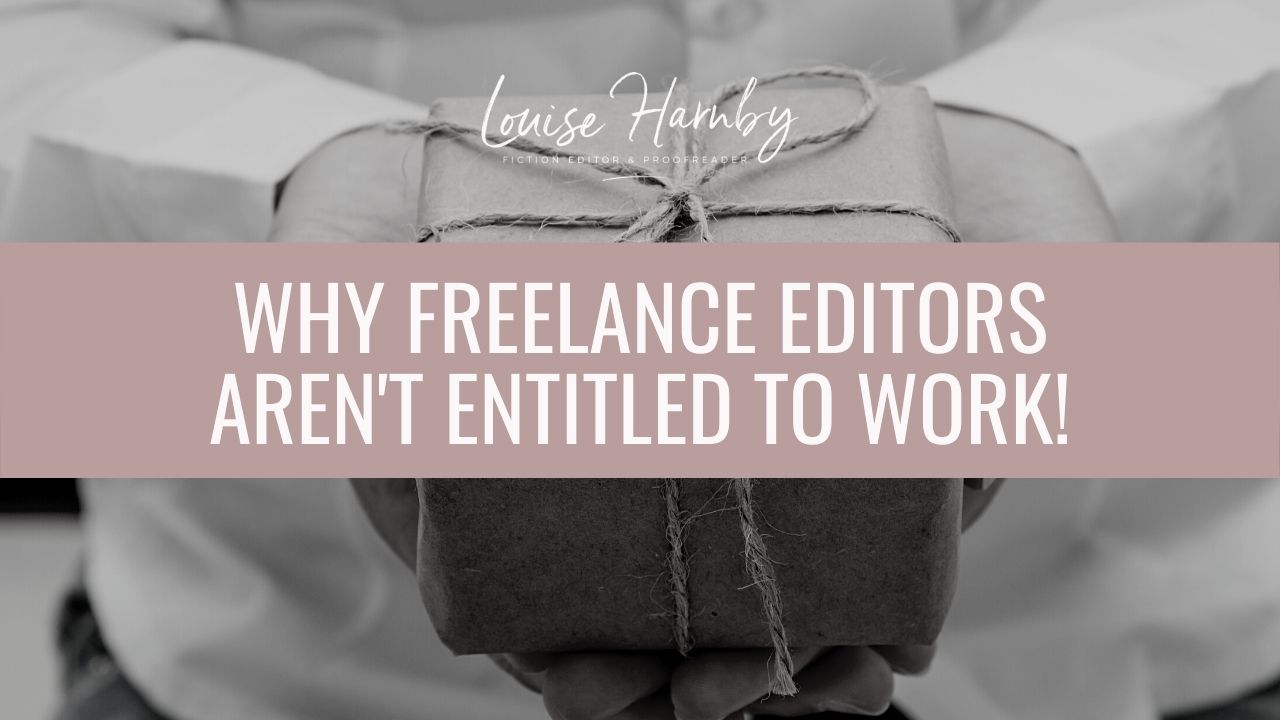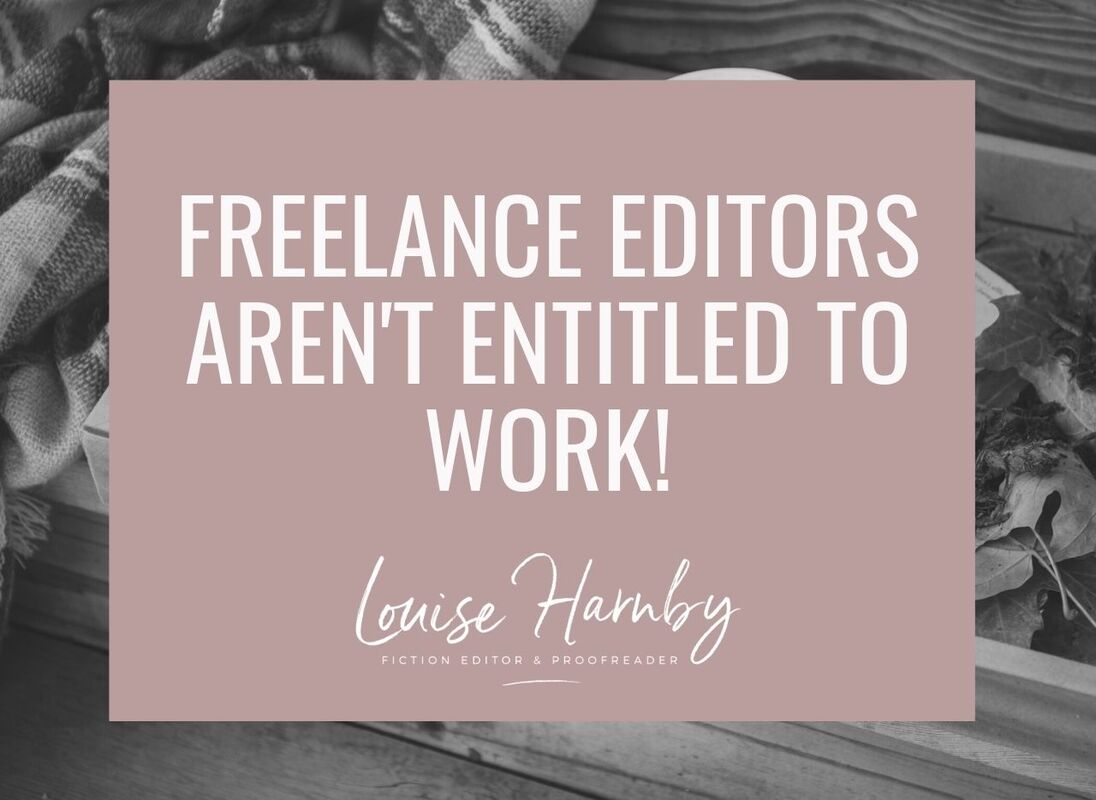|
Just becoming editors doesn’t bestow special privileges upon us that are not available to other types of working people. Being editors doesn’t mean we’re entitled to be commissioned. Nor does it mean that we’re entitled to earn what we’d like to earn.
Why entitlement won't work for the self-employed
Entitlements are the domain of employees. Freelance editorial pros aren't employees of businesses; they're the owners of those businesses. Work has to be found, which means clients have to be found. We don't live in command economies where the State hands out jobs and you take what you get. We've chosen to run businesses so we have to find a way to make them function successfully. The alternative is unpalatable. In a global market, where clients come from all over, and have different budgets, requirements and expectations, what those clients will be able or prepared to pay will vary enormously. Consequently, of all the clients we find via our extensive marketing efforts, only some will be a price match for us. For that reason, we need to be visible to as many as possible, because the bigger the pot the greater the chance of a conversion. To recap, just being an editor in itself will provide us with neither work nor the money we expect to be paid for the value we believe we bring to the table. Doing visibility is the key to cracking the problem.
Imagine being a teacher ...
Do you know a teacher? Does that person have a paying teaching job? How did they get that teaching job? Are they happy with their salary? If not, ask them what they would have to do to solve the problem. I know a teacher. She trained for the role. After her training was complete, she didn't have a job. So she had to find a job. She didn't sit there and say, ‘I'm a teacher. Where's the work?’ She went and searched for the work. She did loads of research, applied for tons of jobs, reviewed the packages on offer, prepared for a stack of interviews, attended them (which was stressful), filled in her spare time with voluntary work in the education sector to make her CV sing, and finally found a school who wanted her and for whom she wanted to work. For a few years the package worked for her, and then it didn't. She didn't say, ‘This school is predatory.’ She said, ‘I need to find a new job.’ So she did a lot more work. Now that she was more experienced and had higher expectations, it was tricky to find a good match. It took a lot of time, a lot of hard graft, a lot of research, but I never heard her moan. I'd ask how the job search was going. ‘Ticking along. No news yet but I'll know when I find it. The current post isn't perfect but it's better than being unemployed. You hear about Si? He’s been made redundant. Nightmare. He's really down in the dumps.’ My friend did secure a better teaching post. She worked her backside off to find that job. It would've been nice if it had landed in her lap, but that’s not how the teaching sector works. And it's not how the freelance editing sector works either. We have to work our backsides off to find the work we want to do and that pays the fees we want to earn.
Feeling ripped off?
If you're feeling ripped off, that's okay. We’ve all done work that made us feel undervalued and underpaid. That's kind of how my teacher friend was feeling. Time to replace that rip-off work with a better package. Be aware, though – this won't happen overnight. If you're not visible to those offering better-paying work, you'll have to make yourself visible, which takes a lot of hard graft. It took my teacher pal a couple of years to replace her employer with one offering the package she wanted. It might take you a couple of years to make yourself visible to the clients you want to work with. This could mean you have to stick with the current client while you're working your backside off to find a new and better-paying replacement.
The client under the microscope
In the meantime, take a good hard look at the client. If you're feeling ripped off, it can be useful to examine not just the deficiencies but also the benefits. This kind of exercise can shine a light on some of the value you might have overlooked, value that you may not have costed into your analysis. Turnover So the work isn't paying you what you'd like to earn, but is there a lot of it on offer? Every time you receive an email that offers you work on a plate, you get to fill your schedule with absolutely no effort on your part whatsoever. Some people have a few regular clients who provide 90% of their work. Others have a few regular clients who provide only 20% of their work; the other 80% is new business. New business needs to be found and converted into a working relationship. Which leads us to marketing … Marketing If you fill your schedule with a lot of work from one agency (or publisher or packager), and you think said agency is ripping you off, ask yourself how come they've got so much work that they can fill 80% of your schedule and the same percentage of many of your colleagues’ schedules. Is it because they’re marketing their backsides off? Then ask yourself whether you're prepared to make the same investment, because that's what you'll have to do. You'll have to do all the hard graft yourself. Marketing an editorial business isn't just a cute little hobby you dip your toes into a couple of times a year. Well, actually, it can be if you get someone else, like the agency, to do the graft for you (and there’s nothing wrong with that), but there'll be a cost to it because they'll take a cut of every penny you earn. And that's fair enough because there is a cost to finding clients. Marketing takes time, and time is money. So if you don't want to lose a cut, you have to fork out for the marketing investment. In other words, we don't get to have it both ways. We can't expect someone else to find our clients for us and expect to earn as much as if those clients were coming direct. If we did expect that, who'd be ripping off whom?
Still want an exit?
Fair enough. Start actively promoting so that you can phase out the lower-paying client(s) and replace them with new customers who'll pay what you want to earn. Plan for this to take time and a lot of work. If you don't fancy the transitional approach, you can wave goodbye to the work immediately. If that's the case, you either live with someone who can pay all your bills (quite possible, and good for you), you have a trust fund (less likely, but wow), or you're happy to be partially unemployed for a while. As you can probably tell, I favour the transition method! That's because my family situation means my income, although the secondary one in our family, is essential. When I was starting out, I couldn't afford to turn down work on principle while I was finding better-paying alternatives. I had to use a phasing-out approach (if negotiation wasn't on the table). Of course, it may be that you already have enough higher-paying clients to cover the lost income from the existing customer, but if that's the case you probably nailed your marketing strategy years ago!
We're responsible
No one else is responsible for the rates we earn, the clients we find (or whom we enable to find us), the tools we use to make ourselves visible, the equipment we buy, the tax returns we file, the colleagues we talk to, the meetings we attend. It's all down to us. We're not entitled to have anything land in our lap. As business owners, we reap all the benefits, but we have to do all the work. Every time we hand over some of that graft to another entity (finance to the accountant; client-finding to an agency; fee-handling to a money-transfer organisation), we see a cut in profits. That's not being ripped off; it's a cost of business. If you don't want to bear the cost, you have to do it yourself. Being an editor isn't enough when we're freelance. If we're not wearing the many hats required for business ownership (or we resent bearing the cost of someone else wearing them for us), we need to take a step back and consider whether it’s time to make some changes. What we are entitled to What we are entitled to do is to make our own decisions. We’re entitled to choose the clients, the rates, and the types of work that suit our needs. So if you want to work for a packager or an agency that pays less than a colleague thinks is acceptable, but there’s value in it for you and your business, that’s fine. If you want to decline the work and source your own clients direct, that’s fine too. Me? I’ve done both in my time because it was right for me. You’re entitled to the same choice. Good luck!
Louise Harnby is a line editor, copyeditor and proofreader who specializes in working with crime, mystery, suspense and thriller writers.
She is an Advanced Professional Member of the Chartered Institute of Editing and Proofreading (CIEP), a member of ACES, a Partner Member of The Alliance of Independent Authors (ALLi), and co-hosts The Editing Podcast. Visit her business website at Louise Harnby | Fiction Editor & Proofreader, say hello on Twitter at @LouiseHarnby, connect via Facebook and LinkedIn, and check out her books and courses.
4 Comments
2/3/2017 06:16:20 pm
Brilliant article and good on you for saying this stuff. I'm in the fortunate position where I'm made visible by the people who recommend me to their peers, but I worked very hard to get here and still work hard to keep those people recommending me and turn their recommendations into regulars.
Reply
2/3/2017 06:26:59 pm
You make an excellent point, Liz. It's a work ethic that continues even once one's business has matured!
Reply
Louise Harnby
20/4/2019 08:47:50 pm
Cheers, Keri!
Reply
Leave a Reply. |
BLOG ALERTSIf you'd like me to email you when a new blog post is available, sign up for blog alerts!
TESTIMONIALSDare Rogers'Louise uses her expertise to hone a story until it's razor sharp, while still allowing the author’s voice to remain dominant.'Jeff Carson'I wholeheartedly recommend her services ... Just don’t hire her when I need her.'J B Turner'Sincere thanks for a beautiful and elegant piece of work. First class.'Ayshe Gemedzhy'What makes her stand out and shine is her ability to immerse herself in your story.'Salt Publishing'A million thanks – your mark-up is perfect, as always.'CATEGORIES
All
ARCHIVES
July 2024
|
|
|
|





















 RSS Feed
RSS Feed





